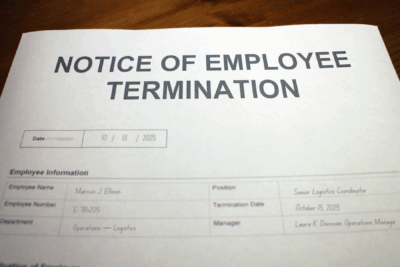Losing a job is never easy. Beyond the financial strain, it can affect your sense of stability, career trajectory, and even your confidence. But when your termination doesn’t feel fair, or seems tied to retaliation, discrimination, or another unlawful reason, it raises an even bigger question: were you wrongfully terminated?
Wrongful termination happens more often than many employees realize. Even in states that follow the at-will employment rule, employers cannot dismiss workers for reasons that break federal or state laws. Firing someone after they report harassment, file a wage complaint, or take protected medical leave isn’t only unethical but also illegal.
Unfortunately, these situations are not always obvious. Sometimes the signs are subtle, such as a sudden negative performance review after years of receiving strong feedback, or suspicious timing where a firing occurs just after you have exercised your legal rights. Understanding these warning signs and knowing the protections available is crucial to safeguarding your career.
This guide will walk you through what it means to be wrongfully terminated, the most common red flags, how courts analyze claims, and what employee rights after being fired look like under federal law. We’ll also explain how experienced employment attorneys can help navigate wrongful termination and what to do if you’ve been unfairly fired.

What It Means to Be Wrongfully Terminated
Under federal law, a firing is considered unlawful if it violates specific employee protections. Employees may not be dismissed based on race, color, religion, sex, national origin, disability, age, or genetic information (protected classes under federal discrimination law). Employers are also prohibited from retaliating against workers who exercise legal rights, such as reporting harassment, filing wage complaints, or requesting medical leave.
Unlawful terminations can involve retaliation for asserting wage rights, breaches of employment contracts, or firings that go against public policy. Together, these laws establish that not every dismissal is legal, even when employment is considered at-will.
Being wrongfully terminated means your employer crossed these legal boundaries, and you may have grounds for recourse.
Common Signs You May Have Been Wrongfully Terminated
It is not always obvious when a termination crosses into unlawful territory. Some red flags are clear, while others are more subtle. Here are some of the most common signs:
- Fired After Reporting Discrimination or Harassment: If you were dismissed soon after filing a complaint about discrimination or workplace harassment, it may qualify as retaliation.
- Retaliation for Protected Activities: Termination after requesting family or medical leave, filing a wage complaint, or cooperating with a government investigation is often unlawful.
- Negative Performance Reviews Following a Complaint: A sudden shift in evaluations after you engage in protected activity can signal retaliatory intent.
- Violation of Employment Contract: If your contract or employee handbook outlines job security or termination procedures that were not followed, this may support a wrongful termination claim.
- Suspicious Timing: Being fired immediately after asserting your rights, for example, reporting unsafe working conditions, is a strong red flag.
Each of these examples illustrates how employers may sometimes disguise retaliation or discrimination as legitimate business decisions. If you experienced one of these scenarios, you may have been wrongfully terminated.

Understanding At-Will Employment and Its Exceptions
Most U.S. employees work under the doctrine of “at-will” employment. This means either the employer or employee can end the relationship at any time, with or without notice. However, there are important exceptions.
The Bureau of Labor Statistics (BLS) identifies three key exceptions to at-will employment:
- Public Policy Exception – Employers cannot fire employees for reasons that violate public policy, such as serving on a jury or refusing to engage in illegal activity.
- Implied Contract Exception – Even without a written contract, statements in handbooks, offer letters, or oral promises may create implied protections against arbitrary termination.
- Covenant of Good Faith Exception – Some courts recognize that employers must act in good faith, preventing terminations motivated by malice or bad faith.
Courts often analyze wrongful termination claims through these exceptions, distinguishing between lawful dismissals and those that violate employee rights. This framework is crucial for employees wondering whether they were wrongfully terminated.
Employee Rights After Being Fired
Even after losing your job, you are not without protection. Federal law protects certain employee rights after being fired, particularly in cases of wrongful dismissal.
For example:
- You may qualify for continued health coverage through COBRA and unemployment insurance benefits.
- If retaliation was involved, you may be eligible to file a claim with the EEOC or your state labor agency.
- Workers who were dismissed for discriminatory reasons can pursue reinstatement, back pay, or damages.
Understanding your employee rights after being fired helps ensure that you do not leave any legal remedies unexplored. These rights exist to prevent employers from escaping accountability and to protect workers from lasting harm.
Can I Sue for Wrongful Termination?
One common question employees ask is: Can I sue for wrongful termination? The answer depends on your specific situation, but the short response is yes if your firing was in violation of the law.
The process typically begins by filing a complaint with the EEOC or your state labor board. These agencies investigate retaliation, discrimination, and other unlawful dismissals. Once administrative remedies are pursued, employees often have the right to file a lawsuit in court.
These questions show where wrongful termination often occurs:
- Can I sue for wrongful termination if I was fired after filing a wage complaint? Yes, because retaliation is unlawful.
- Can I sue for wrongful termination if my employer ignored my employment contract? Yes, because breach of contract is a legally actionable offense.
- Can I sue for wrongful termination if I was let go right after requesting medical leave? Yes, since that may violate the Family and Medical Leave Act.
- Do I Have a Case for Wrongful Termination? Yes, if your dismissal violated federal or state protections, you may have grounds to take legal action.
Damages in these cases may include lost wages, emotional distress compensation, and, in some instances, reinstatement. With the proper legal guidance, employees can pursue justice against employers who act unlawfully.
How Cantrell Schuette Can Help
If you believe you were wrongfully terminated, you don’t have to face your employer alone. Cantrell Schuette is a national employment law firm dedicated to protecting workers nationwide. Our attorneys investigate claims, gather evidence, and pursue justice through negotiation, settlement, or litigation.
We understand how devastating job loss can be, both financially and emotionally, and how it can impact one’s professional life. Our team is committed to ensuring that your employee rights after being fired are fully protected. Whether your case involves retaliation, discrimination, or breach of contract, we will hold employers accountable for unlawful actions.
Your Legal Options Moving Forward
Being wrongfully terminated can derail your career and disrupt your life. However, you have rights, and legal remedies are available to protect you. Recognizing the warning signs, understanding at-will employment exceptions, and knowing when to seek help are essential steps toward justice.
If you are asking yourself, “Can I sue for wrongful termination?” the answer may be yes, but timing is crucial. Acting quickly preserves your rights and strengthens your case.
If you believe you’ve been wrongfully terminated, don’t wait to get answers. The attorneys at Cantrell Schuette are here to help you understand your rights and fight for justice. Contact us today to discuss your situation in confidence.


